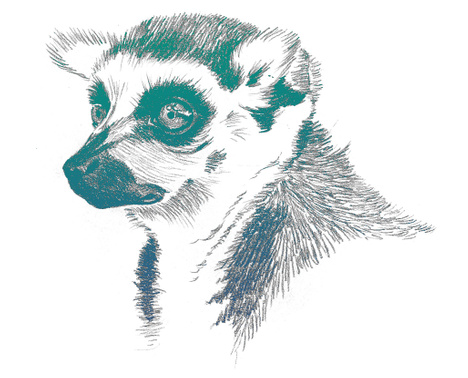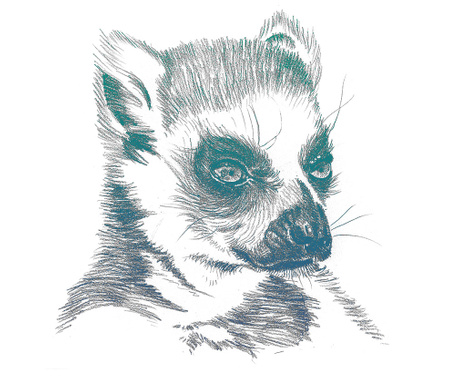About the Lemur Troop
In 2007, a pair of captive ring-tailed lemurs adopted into their small troop a wayward human caretaker. Driven by recent heartbreak and a desire for a more meaningful life, this assigned trainer had forsaken a comfortable middle-class existence to pursue his dream of becoming a zookeeper. His name was Alex, and he was no ordinary trainer. Tasked not only with caring for and training the notoriously aggressive male lemur named Obi, but he also took on the challenge of learning to communicate with these misunderstood and belittled primates.
Despite Obi’s long, infamous history of viciously attacking his caretakers, he seemed to accept this new trainer readily. The more Obi trusted Alex, the more his trainer let down his guard and listened. To Alex’s surprise, the little lemur began to communicate in ways typically thought impossible for such a small-brained animal. The more Alex understood and appropriately responded using lemur calls, the stronger their relationship grew. It was the friendship of a lifetime, weathered through the brutal hardships of life.
The troop matriarch, named Janga, initially cared little for the human newcomer. Alex’s lack of respect for her authority bought him no favor. But as Obi and Alex bonded against her wishes, she found herself up against an equally headstrong opponent. Unlike ordinary people, the upstart whom Obi had invited into her troop proved that he could both understand her calls and reply like a lemur. Reluctantly, she accepted him, but not without conditions. A firm teacher, Janga had an essential lesson for Alex to learn if he wished to join her small troop.

“Janga”
Official name: Maha Jenga
20 Mar 1997 – 27 Nov 2014
Named after Mahajanga, a major port city in Madagascar, Janga was like any ring-tailed lemur matriarch: confident, assertive, and entitled. Her early loss of her entire family seemed to shape her sentiments towards people and her relationships with human caretakers. Despite her efforts to curry favor with them, she remained distrustful of humans and pointedly rebuffed their attempts to socialize. Though her kingdom was small and her "troop" minimal, she ruled with the air of a real regent. In addition to Obi’s companionship, she relished the stable consistency of her life and the best of everything her caretakers had to offer.
“Obi”
Official name: Lenny
11 Apr 1993 – 1 May 2020
Born a runt and abandoned by his mother, Obi grew up under human care. Unlike Janga’s distrust of humans, Obi’s obsession with people soon created problems. Once mature, he interpreted human behavior from a ring-tailed lemur perspective. Because few humans understood his world or respected his perception of territory and troop, Obi often found himself at odds with his caretakers. With his warnings and threats ignored, this high-strung lemur defended himself with violence. Soon, Obi became notorious as a vicious biter.
In a life of constant misunderstanding, only Janga’s companionship and the occasional sympathetic caretaker soothed Obi’s restlessness until he met Alex. Once torn between the lemur and the human worlds, Obi had found a kindred spirit.
Alex
Nickname: “Maky”
Once assigned as Obi’s trainer, Alex discovered his passion for lemurs. Stunned by Obi’s intelligence, he carefully observed and listened to this little lemur. With Obi’s help, he learned to imitate lemur calls and share in the troop’s daily routine. In time, both Obi and Janga came to accept him as more than just an ordinary caretaker. As socially awkward as Obi, but for different reasons, Alex had struggled to find any sense of connection with others. Adopted into the lemur troop, Alex shared Obi’s duality and found his peace.
Inspired to learn about the intellectual divide between lemurs and humans, as well as the evolutionary history that separated them, Alex explored the academic literature and performed independent observational research. His passion drove him to share what he learned through Wikipedia editing and public speaking. At the end of their adventure, he found a more profound significance to his troop’s tribulations—one that applied equally to the human world—and made it his goal to share it.


